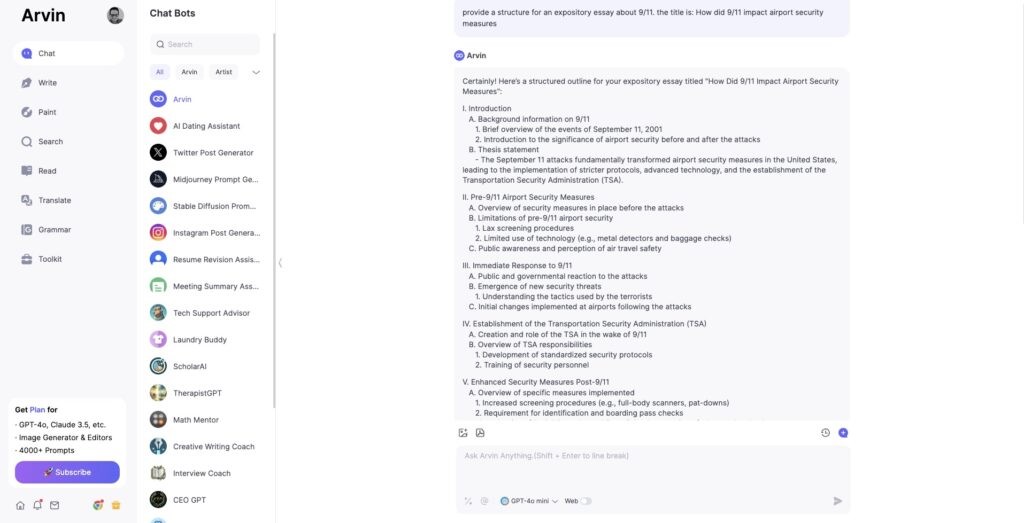Learning how to write an expository essay will help to boost your grades.
Alongside argumentative, narrative, and descriptive, expository essays are one of the main essay types set by teachers at the tertiary level. Therefore, if you’re studying at college, you will need to learn how to write an expository essay at some stage.
Though no essay is easy, the expository form is relatively straightforward. After all, you don’t need to make a compelling argument. The objective is to present information, research, facts, and arguments about a specific topic to show you fully understand it.
In this article, we present tips on how to write an expository essay. We also provide examples that illustrate our points. We round things off by explaining how you can use Arvin’s AI tools to structure and plan an expository essay to make your life that little bit easier.
What is an expository essay?

An expository essay is an academic assignment used to explain or describe something. Therefore, it’s an essay with a clear and focused explanation of a specific topic.
It’s different from other essays as you don’t necessarily need to compare and contrast different academic arguments. The idea is to provide a balanced, concise explanation of something. It’s a test of the student’s ability to be objective and to show an understanding of a topic of study.
Expository essay title examples
Here are some example titles that can help you conceive what an expository essay might look like once written:
- History: The role of tanks in global warfare since the Second World War.
- Science: How Net Zero climate change pledges work.
- English Language: George Orwell’s literary experience in the Spanish Civil War.
- Health: The importance of regular exercise for improved mental health.
- Politics: The history of dynastic rule in North Korea.
- Culture: How social media influences attitudes towards race.
As you can see, these essay titles have a specific topic in mind. Your role as a student is to thoroughly research the topic and provide a balanced overview in your expository essay.
You don’t need to take a position. For example, you don’t have to argue that tanks have played a negligible role in global warfare since the Second World War. Rather, the goal is to present the topic as a whole and to be objective and comprehensive in your presentation.
When are expository essays required?
Often, expository essays are set by teachers as a way to examine your understanding of a topic. Therefore, they might be presented as an exam question or in a class test. Equally, some lecturers might set expository essays as coursework.
When in an exam setting, you will have to do your research beforehand, and your revision will help you understand and engage with the topic. However, if set as coursework, you will have time to research the topic by reading articles, books, and published pieces relating to the topic.
How to write an expository essay: Start with the correct type and form
Before revealing how to write an expository essay, we need to reveal the different types of essays that you might be required to write. After all, there isn’t just one way to research, structure, and write an expository essay. Consider the expository essay types below and decide which is most appropriate for your studies:
Definition essay
This is perhaps the simplest type of expository essay. Your objective is to define something by presenting clear facts and arguments about a topic. For example:
- Explain how the Conservative Party was formed.
The goal here is clear – to define or explain how the Conservative Party was formed. You will need to research the historical founding of the political party and look at source material from the time. You will introduce key figures and explain the context in which the Party was founded.
Classification essay
Here, the objective is to provide an overview of numerous subjects within a specific category. For example:
- Explore the different types of stress and explain their impact on physical health.
In this classification essay, you need to look at the different types of stress, including acute, episodic, and chronic. Then, you would consider which had the most severe impact on a person’s physical health, with research and statistics backing up your claims.
Process essay
In a process essay, you must explain how a task should be completed. You can think of it like following a cooking recipe. For example:
- How to perform a close reading of a literary text.
In this assignment, a literature professor has tasked you with explaining how to perform a close reading of a specific text. You would begin by explaining what a close reading is before taking the reader through the precise steps required to conduct such a reading.
Cause-and-effect essay
This is a common type of expository essay and is often used by teachers and professors to gauge a student’s ability to relate different events to one another. For instance:
- How did 9/11 impact airport security measures?
In this example, you’re required to consider the impact of the 9/11 terrorist attacks on airport security. This includes having air marshalls on some flights, increasing baggage screening, and other impacts.
How to write an expository essay – the ideal structure

As highlighted above, learning how to write an expository essay really depends on the type of essay you need to write. After all, a cause-and-effect essay will be different from the structure of a definition essay.
Still, you can follow a fairly typical essay structure to ensure you cover all bases and write a compelling, engaging assignment:
The introduction
Every academic essay must start with a relevant introduction. You should present the topic of the essay and your thesis statement. It’s also a good idea to explain what you’re going to cover and which argument you will make in the essay.
The main body
The main body of the essay should be broken down into paragraphs. The length of the body depends on the word count, but you can expect it to make up around 70% of your expository essay.
Each paragraph that you write must have a purpose, and it should make an argument. Consider structuring each paragraph with its own beginning, middle, and end. A high-quality topic sentence will help you introduce the main body of the text, which you should include in every paragraph. Here’s an example of a high-impact topic sentence:
The terrorist attacks on 9/11 completely changed the way that security screening was done at every airport in the world.
You would then go onto explain how 9/11 changed airport screening and reveal some specific changes, ideally with some external sources that back up your claims.
The conclusion
The conclusion of an expository essay is where you bring everything together. But remember, you don’t necessarily need to make a compelling argument here, as is the case with other academic assignments.
For instance, if you’ve written a definition essay, it’s more than enough to close by reaffirming the main reasons you have already presented in the essay.
Finishing your conclusion with a memorable, key takeaway that is a strong and concise closing sentence is advisable. For instance:
Ultimately, 9/11 changed airport security beyond recognition. The introduction of sophisticated scanners, the presence of air marshalls, and the restriction on goods taken on aircraft have all made aviation much safer since the terrorist attacks on New York and Washington DC.
Remember not to introduce new information at this stage. Your conclusion should recap the information you’ve already presented and affirm your overall argument.
How to write an expository essay with the help of AI
AI tools like Arvin can help to structure and plan your academic assignments. While you shouldn’t use AI to write the content of your essay, it’s a brilliant way to get the structure correct and to cover all crucial bases.
For example, we asked Arvin to provide a suitable structure for an expository essay about 9/11, using the title introduced above. Below is the recommended structure:

As you can see, Arvin’s recommendations offer a highly detailed and relevant structure for an essay title that we created earlier. While we don’t have to cover all the points listed, it’s a brilliant starting point. We can decide which points to cover, research, and include in the essay.
Don’t forget that you can also use our free AI Grammar Checker to ensure your spelling, grammar, and punctuation are correct. You don’t want to submit an expository essay that’s littered with mistakes, as you will lose marks. After all, research shows that up to 30% of college students struggle with basic grammar and don’t have the requisite skills to write and submit accurate essays.
A quick word on the other essay types
Now that you know how to write an expository essay, we want to briefly touch on the other main types of academic essays so you know the differences:
- Argumentative: Here, you’re required to form an opinion about a topic based on research. You should then use evidence to back up your argument.
- Narrative: You’re required to present a compelling narrative about a topic by using creative and appropriate language.
- Descriptive: The purpose of this essay is to describe something in significant detail, using appropriate language and being as specific as possible.
Depending on your course, you will likely have to write each type of essay from time to time.
Recap on how to write an expository essay
Learning how to write an expository essay isn’t so different from writing any other assignment. However, you must understand that there are different types of expository essays. This will help you to structure your essay appropriately.
Moreover, remember that expository essays don’t necessarily require you to take an independent viewpoint. The main objective is to present a balanced and comprehensive overview of the topic in question.
You can always use AI tools like Arvin to help you plan and structure your essay. Use our example above as a guide and submit a prompt to receive an ideal structure for your upcoming assignment.
How to write an expository essay FAQ
How do I start an expository essay?
You should start an expository essay with a strong introduction and a thesis statement. Your introduction must introduce the points you will cover and the research that you will present in the paper.
What is an example of an expository essay?
There are several types of expository essays. For instance, definition, clarification, process, and cause-and-effect essays are all examples of expository assignments. Each of these requires a slightly different structure and approach as they all present information in different ways.
Is an expository essay difficult to write?
Compared to other types of academic assignments, expository essays are fairly easy to write. This is because they don’t require you to present your own opinion and back it up. Rather, the objective is to present information relating to a specific topic. It should be balanced, objective, and comprehensive, showing your teacher or lecturer that you understand the subject.
How to write an expository essay easily?
The easiest way to write an expository essay is to plan, research, and structure it well. You can use AI tools to create the ideal structure. Our tools also help you to check your work for grammar, punctuation, and spelling. This should remove any mistakes from your work before submission, making your life much easier as a student.






